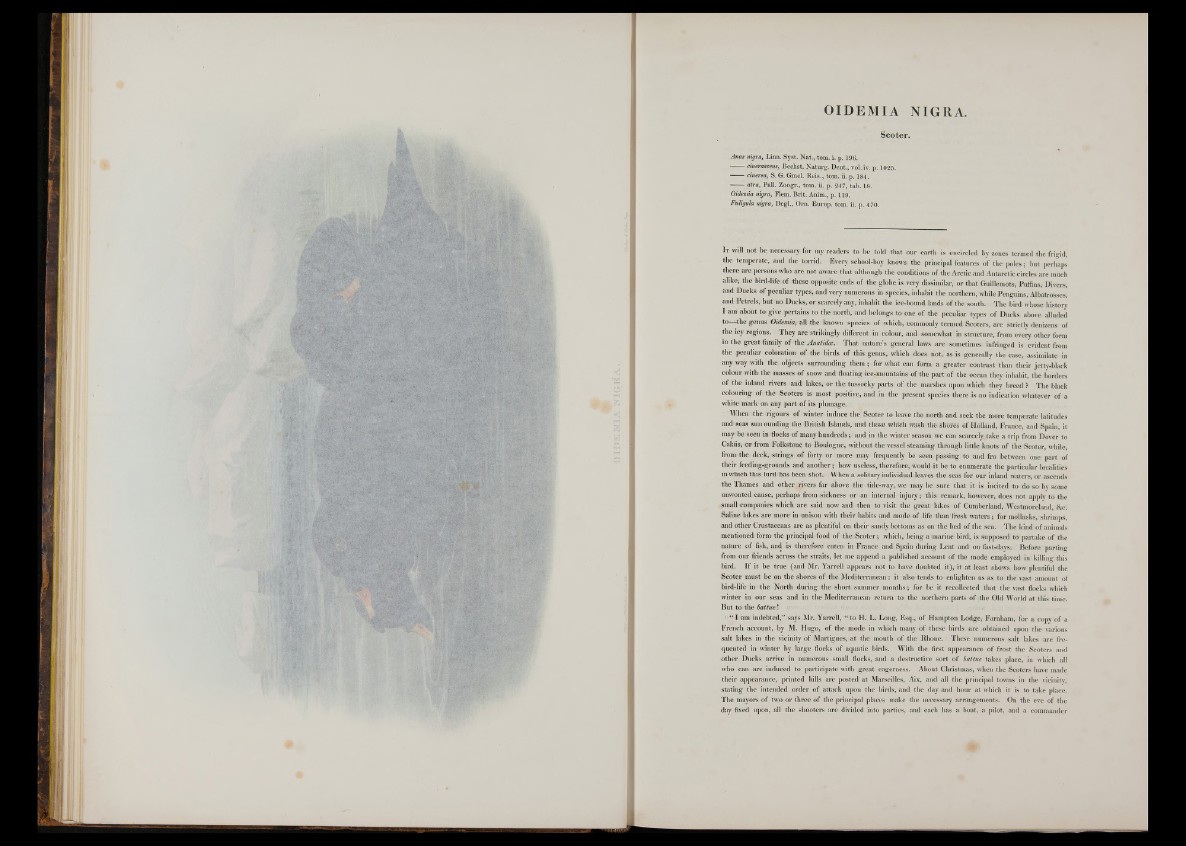
OIDEMIA NIGRA.
Scoter.
Anas nigra, Linn. Syst. Nat., tom. i. p. 196.
dnerascens, Bechst. Naturg. Deut., vol. iv. p. 1025.
cinerea, S. G. Gmel. Reis., tom. ii. p. 184.
atra, Pall. Zoogr., tom. ii. p. 247, tab. 18.
Oidemia nigra, Flem. Brit. Anim., p. 119.
Fuligula nigra, Degl., Orn. Europ. tom. ii. p. 470.
It will not be necessary for my readers to be told that our earth is encircled by zones termed the frigid,
the temperate, and the torrid. Every school-boy knows the principal features o f the poles ; but perhaps
there are persons who are not aware that although the conditions of the Arctic and Antarctic circles are much
alike; the bird-life o f these opposite ends o f the globe is very dissimilar, or that Guillemots, Puffins, Divers,
and Ducks o f peculiar types, and very numerous in species, inhabit the northern, while Penguins, Albatrosses,
and Petrels, but no Ducks, or scarcely any, inhabit the ice-bound lands of the south. The bird whose history
I am about to give pertains to the north, and belongs to one o f the peculiar types o f Ducks above alluded
to—¿-the genus Oidemia,; all the known species o f which, commonly termed Scoters, are strictly denizens of
the icy regions. They are strikingly different in colour, and somewhat in structure, from every other form
in the great family o f t h e Anatidce. That nature’s general laws are ■ sometimes infringed is evident from
the peculiar coloration of the birds o f this genus, which does riot, as is generally the case, assimilate in
any way with the-objects surrounding them; for what can form a greater contrast than their jetty-black
colour with the masses of snow and floating ice-mountains of the part of the ocean they inhabit, the borders
o f the inland rivers and lakes, or the tussocky parts of the marshes upon which they breed ? The black
colouring of> the Scoters is most positive, and in the present species there is no indication whatever o f a
white mark on any part o f its plumage.
When the rigours o f winter induce the Scoter to leave the north and seek the more temperate latitudes
and seas surrounding the British Islands, and those which wash the shores of Holland, France, and Spain, it
may he seen in flocks of many hundreds ; and in the winter season we can scarcely take a trip from Dover to
Calais, 'or from Folkstone to Boulogne, without the vessel steaming through little knots of the Scoter, while,
from the deck, strings o f forty or more may frequently be seen passing to and fro between one part of
their feeding-grounds and another; how useless, therefore, would it be to enumerate the particular localities
in which this bird has been shot; When a solitary individual leaves the seas for our inland waters, or ascends
the Thames and other rivers far above the tide-way, we may be sure that it is incited to do so by some
unwonted cause, perhaps from sickness or an internal injury ; this remark, however, does not apply to the
small companies which are said now and then to visit the great lakes of Cumberland, Westmoreland, &c.
Saline lakes are more in unison with their habits and mode o f life than fresh waters; for mollusks, shrimps,
and other Crustaceans are as plentiful on their sandy, bottoms as on the bed of the sea. The kind o f animals
mentioned form the principal food o f the Scoter ; which, being a marine bird, is supposed to partake o f the
nature o f fish, and is therefore eaten in France and Spain during Lent and on fast-days. Before parting
from our friends across the straits, let me append a published account o f the mode employed in killing this
bird. If it be true (and Mr. Yarrell appears not to have doubted it), it at least shows how plentiful the
Scoter must he on the shores o f the Mediterranean : • it also tends to enlighten us as to the vast amount of
bird-life in the North during the short summer months; for be it recollected that the vast flocks which
winter in our seas and in the Mediterranean return to the northern parts o f the Old World at this time.
But to the battue !
“ I am indebted,” says Mr. Yarrell, “ to H. L. Long, Esq., of Hampton Lodge, Farnham, for a copy o f a
French account, by M. Hugo, o f the mode in which many of these birds are obtained upon the various
salt lakes in the vicinity o f Martigues, at the mouth o f the Rhone. These numerous salt lakes are frequented
in winter by large flocks o f aquatic birds. With the first appearance o f frost the Scoters and
other, Ducks arrive in numerous small flocks, and a destructive sort o f battue takes place, in which all
who can are induced to participate with great eagerness. About Christmas, when the Scoters have made
their appearance, printed hills are posted at Marseilles, Aix, and all the principal towns in the vicinity,
stating the intended order of attack upon the birds, and the day and hour at which it is to take place.
The mayors o f two or three o f the principal places make the necessary arrangements. On the eve o f the
day fixed upon, all the shooters are divided into parties, and each has a boat, a pilot, and a commander